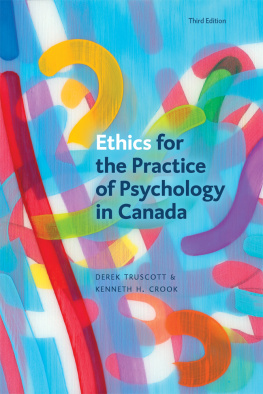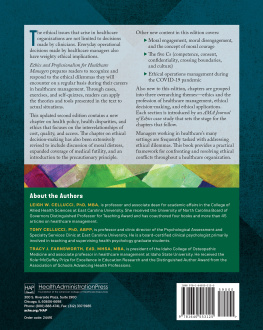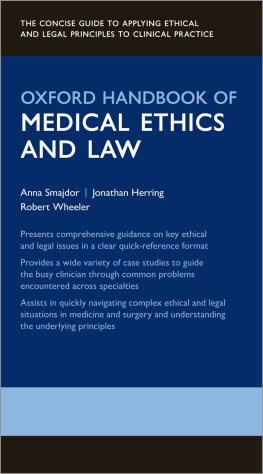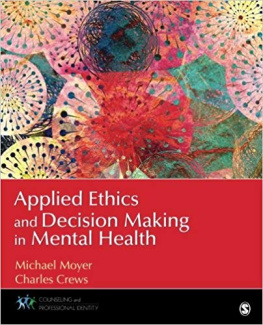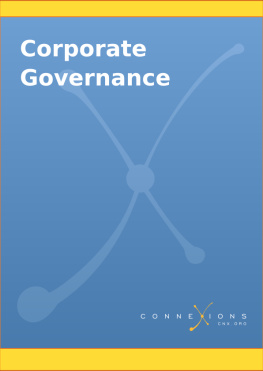
Published by
University of Alberta Press
116 Rutherford Library South
11204 89 Avenue nw
Edmonton, Alberta, Canada t6g 2j4
Amiskwacwskahican | Treaty 6 | Mtis Territory
uap.ualberta.ca
Copyright 2021 Derek Truscott and
Kenneth H. Crook
LIBRARY AND ARCHIVES CANADA CATALOGUING IN PUBLICATION
Title: Ethics for the practice of psychology in Canada / Derek Truscott, Kenneth H. Crook.
Names: Truscott, Derek, 1959 author. | Crook, Kenneth H., 19602008, author.
Description: Third edition. | Includes bibliographical references and index.
Identifiers: Canadiana (print) 20210172185 |
Canadiana (ebook) 20210172282 |
isbn 9781772125429 (softcover) |
isbn 9781772125597 (epub) |
isbn 9781772125603 (pdf)
Subjects: lcsh: PsychologistsProfessional ethicsCanada. | lcsh: PsychologyMoral and ethical aspectsCanada. | lcsh: PsychologistsLegal status, laws, etc.Canada.
Classification: lcc bf76.4 .t78 2021 |
ddc 174/.915dc23
First edition, rst printing, 2021.
First electronic edition, 2021.
Digital conversion by Transforma Pvt. Ltd.
Copyediting and proofreading by Joanne Muzak.
Indexing by Judy Dunlop.
Cover design by Alan Brownoff.
Cover image: Sheas Victoria IX study (curves) ,
14 11 inches, acrylic on board, 2020.
Katharine Harvey, www.katharineharvey.com. The artist is represented by Nicholas Metivier Gallery in Toronto. Used by permission.
All rights reserved. No part of this publication may be reproduced, stored in a retrieval system, or transmitted in any form or by any means (electronic, mechanical, photocopying, recording, or otherwise) without prior written consent. Contact University of Alberta Press for further details.
University of Alberta Press supports copyright. Copyright fuels creativity, encourages diverse voices, promotes free speech, and creates a vibrant culture. Thank you for buying an authorized edition of this book and for complying with the copyright laws by not reproducing, scanning, or distributing any part of it in any form without permission. You are supporting writers and allowing University of Alberta Press to continue to publish books for every reader.
University of Alberta Press gratefully acknowledges the support received for its publishing program from the Government of Canada, the Canada Council for the Arts, and the Government of Alberta through the Alberta Media Fund.

Dedicated with love to Alexandra and Sara
Contents
Assumption of responsibility for consequences of action taken:
Feel / Virtue
Preface to the Third Edition
WHEN I STARTED GRADUATE SCHOOL I was giddy with excitement to begin the training I had worked so hard to gain access to. I was also worried. I thought that a good psychologist was one who dispensed wisdom acquired from years of experience. Given that I had considerable maturing to do before anyone would mistake me for astute, I figured I had better learn how to stay out of trouble so I could stay in the profession long enough to acquire at least a modicum of sagaciousness. (And a few big words for good measure.)
I proceeded to throw myself into learning the rules of acceptable professional conduct while I waited to grow older andfingers crossedwiser. Now, some forty years later, I have indeed aged, as well as gained much experience in the practice, study, and teaching of psychology. But somehow it seems that wisdom remains just beyond my grasp. That there is always something more to learn about how best to treat one another. And that is why I have written this third edition. Because writing is the best way that I know to learn. And I love learning about ethics and law.
Although almost no part of this third edition is drawn directly from the first edition Ken and I wrote together, his influence on my thinking about ethics and, in particular, law, continues to shape my writing. His was a remarkable mind, he was a remarkable person, and this book would never have happened without him. I am forever grateful for having known him and consider myself blessed that we were dear friends.
This edition of Ethics for the Practice of Psychology in Canada has been thoroughly revised to incorporate and augment the fourth edition of the Canadian Code of Ethics for Psychologists . It also includes the latest professional and legal standards in all jurisdictions and the current scholarly literature. Readers familiar with the second edition may also notice that I have drawn on the burgeoning field of evolutionary ethics to explain why certain ethical values are important to us as human beings.
Since the second edition was published, the most pressing issues in professional ethics have become the expectations for how psychologists ought to address issues of cultural identity and social justice, and guidance is much sought after. In part as an attempt to address these challenges, the Canadian Psychological Associations fourth edition of the Canadian Code of Ethics for Psychologists was published in 2017. The only noteworthy changes, however, were the renaming of Principle I to Respect for the Dignity of Persons and Peoples and a doubling of the number of times the terms peoples and culture are mentioned. Unfortunately, these minor revisions have only muddied the waters because no guidance is given for what to do when the dignity of a person and the dignity of a group of people are in conflict. And the lowest priority principle of the Code Principle IV Responsibility to Societyis where conflicts between respect for cultural traditions and the status quo would logically be addressed; not in Principle I.
has also been extensively revised to provide guidance to psychologists on the touchy issues around social justice in the context of our responsibility to society. This has been done by stressing how our obligation to society extends to all of its members and is enacted through ensuring that the disciplines structures and policies support just and beneficial purposes, and that psychological knowledge is used for beneficial social purposes.
For over fifteen years, Ethics for the Practice of Psychology in Canada has filled a vital need for a single source on professional ethics and law relevant to Canadian psychologists. Focusing on the most pertinent ethical and legal issues, including decision making, obtaining consent, protecting confidentiality, helping without harming, maintaining professional boundaries, appreciating diversity, being socially responsible, and conducting research, it is an essential resource for students and professionals. The content has been continuously refined in classrooms and presentations to be engaging as well as informative, tested in consultation with practitioners to be maximally useful, and updated to reflect the latest developments in the field.
This book is written primarily for students in professional psychology graduate programs, and is ideal for anyone preparing to practice in Canada or for experienced psychologists seeking to maintain or enhance their ethical knowledge, skills, and courage. Its aims are to
increase your knowledge of ethical, legal, and professional expectations of psychologists;
raise your awareness of ethical issues in psychological practice;
promote your ethical decision-making skills and the ability to resolve ethical dilemmas;
foster your development of a professional ethical identity.
It remains my intention that Ethics for the Practice of Psychology in Canada be useful to you in becoming an ethical psychologist. I therefore welcome any comments you might want to share about this book and your experience of being ethical. I promise to consider them respectfully and thoughtfully, and to incorporate them into a fourth edition, if I have the opportunity to write one.
Next page
